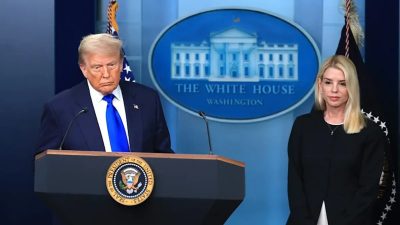US Judge reaffirms nationwide block on Trump’s birthright citizenship order

A federal judge in Massachusetts has reaffirmed a nationwide injunction that blocks US President, Donald Trump’s executive order seeking to limit birthright citizenship in the United States.
US District Judge Leo Sorokin, sitting in Boston, ruled on Friday that the sweeping injunction he issued in February should remain in effect.
He rejected arguments from the Trump administration that a narrower ruling was more appropriate.
The administration had cited a recent US Supreme Court decision that restricted the power of judges to issue broad legal relief.
In his written decision, Sorokin said a national ruling was the only way to fully protect the coalition of Democratic-led states challenging the policy.
“The evidence before him,” Sorokin wrote, “does not support a finding that any narrower option would feasibly and adequately protect the plaintiffs from the injuries they have shown they are likely to suffer if the unlawful policy announced in the Executive Order takes effect during the pendency of this lawsuit.”
White House spokeswoman Abigail Jackson criticized the ruling.
She said in a statement that “courts are misinterpreting the purpose and the text of the US Constitution’s 14th Amendment.”
“We look forward to being vindicated on appeal,” she added.
New Jersey Attorney General Matthew J. Platkin, a Democrat, welcomed the ruling.
“American-born babies are American, just as they have been at every other time in our nation’s history,” he said. “The president cannot change that legal rule with the stroke of a pen.”
Trump signed the executive order on January 20, his first day back in office.
The order directed federal agencies to deny citizenship to US-born children unless at least one parent is a U.S. citizen or lawful permanent resident (green card holder).
The move was quickly challenged by attorneys general from 22 states and immigrant advocacy groups, who argued it was unconstitutional.
The Supreme Court’s June 27 ruling limited the ability of lower courts to issue “universal” injunctions that block federal policies nationwide.
However, the Court also left room for exceptions — a point Sorokin relied on in maintaining the nationwide scope of his order.
A judge in New Hampshire also issued a national injunction in a separate class-action case involving children affected by Trump’s policy.
Earlier this week, a federal appeals court in California ruled that Trump’s order violated the 14th Amendment’s citizenship clause.
It also blocked enforcement of the policy nationwide.
At a recent hearing, the Democratic-led states argued that without a nationwide block, the order would create confusion and logistical problems.
They said a patchwork approach — where the policy is enforced in some states and not others — would disrupt federal programs like Medicaid.
It would also cause a surge of families moving to states where the order is not in effect, straining local resources.
The Justice Department argued the states had failed to adjust their legal position after the Supreme Court’s decision.
The legal battle is expected to continue as the case moves to appeal.
(Reuters)

